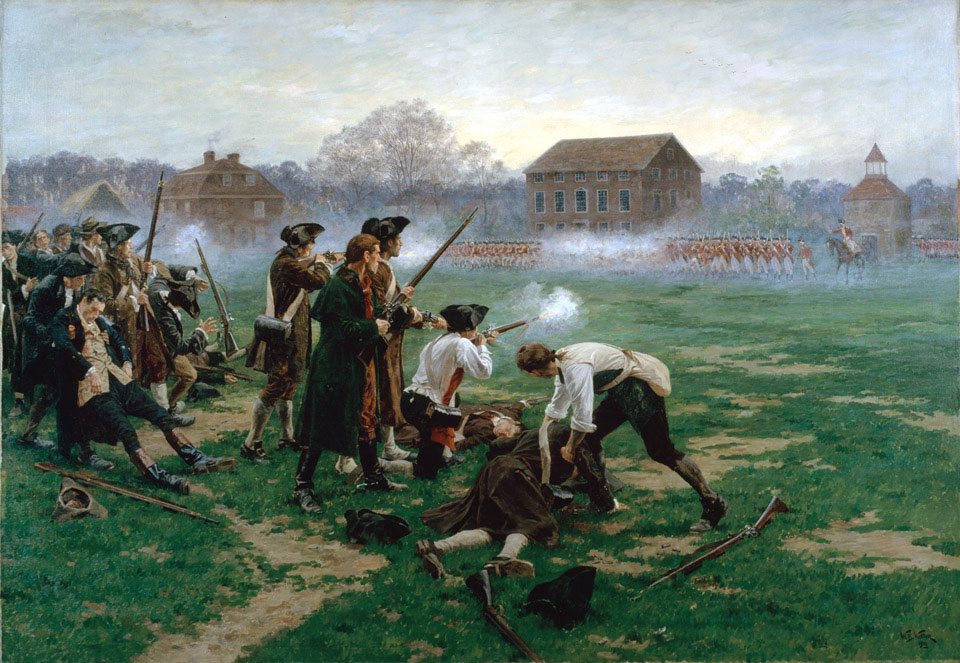In the following excerpt from God Save Benedict Arnold by Jack Kelly, the first shots of the American Revolution echo through the colonies and one man is eager to respond: Benedict Arnold. Read more below.

The sudden arrival of a horseman on a Friday afternoon electrified New Haven. Israel Bissell leapt from his saddle and shouted for the village selectmen. His eyes bulged with news. Citizens came rushing to the green at the center of the prosperous Connecticut seaport. Bissell, his face strained with fatigue, rattled off his brief, shocking story. Fire. Slaughter. War.
Stupid with excitement, he had been riding from Massachusetts since Wednesday morning. Forty miles to Worcester, pushing his horse so hard that the animal dropped dead on arrival. Pounding southward on a fresh mount, he had alerted all those along the dusty roads. Into Connecticut, all night along the coastal post road, throat raw from screaming his warning to every village and farm.
“To arms! To arms!”
He pulled from his shirt a statement by Joseph Palmer of the Massachusetts Committee of Safety. Two days earlier, on April 19, British general Thomas Gage had sent a thousand redcoats marching westward from Boston. At Lexington they confronted “a company of our colony militia in arms, upon whom they fired without any provocation and killed six men and wounded four others.”
The words flashed through the crowd. Repeated in shouts and whispers, they ignited New Haven’s streets and taverns and markets with fear. “I have spoken with several persons,” Palmer wrote, “who have seen the dead and wounded.” Images of blood spilled into the minds of the people. Fear quickly turned to rage.
Bissell had set off too early to know the outcome. The short firefight at Lexington had exploded into a blaze at Concord, a conflagration on the road back to Boston. Fire had consumed homes, bayonets had pierced innocent flesh. “A BLOODY BUTCHERY BY THE BRITISH,” the first newspaper account howled. In fact, well-organized patriot militiamen had shot dead seventy of the king’s soldiers and wounded many more.
In a day, the world had changed.
* * * * *
In New Haven, the news quickly arrived at a prominent mansion on Water Street, “by far the grandest” residence in the town of five thousand souls. The house, with its mahogany paneling, English wallpaper, and sweeping central stairway, was not yet completed that April afternoon. The peach, plum, and cherry trees that filled four acres of orchards were just coming into leaf. The new stables housed some of the finest riding and carriage horses in the region.
The owner, Benedict Arnold, was a fifth-generation American of Puritan stock. His great-great-grandfather, also Benedict, had been governor of Rhode Island—a thousand mourners had attended his funeral a century earlier. His name was handed down through a line of Arnolds but the family wealth was not. The fourth Benedict, a cooper’s apprentice, had settled in Norwich on the eastern edge of Connecticut, married well, climbed the social ladder, and made himself a prosperous merchant and trader. When he succumbed to depression, bad luck, and drink, he left his son, the current Benedict, to start over from scratch.
As soon as word of the violence reached him, Arnold rushed to the town green on a slick stallion. He was greeted with relief by the townspeople. Here was a man to take charge during this daunting time. His eyes, poised between anger and anticipation, swept their faces as he listened to the details. His verdict was simple: They must act. Must march to Boston and join the fight. Must leave today, tomorrow at the latest.
Few in New Haven could match him in enthusiasm. Another man might have weighed the risks. At thirty-four, Benedict Arnold had a lot to lose: a prosperous international trading business, a large retail store, ships and wharfs along the waterfront, a wife he loved, three young sons on whom he doted. “He has had great luck at sea of late,” a neighbor observed. Arnold himself would later testify: “I was in easy circumstances. I was happy in domestic connections and blessed with a rising family.”
Yet Arnold could smell the future. Something fundamental was about to happen, something that could not only alter his life but shape the destiny of the country. He had always felt an irresistible urge, almost a mania, to climb, to acquire, to become somebody. Here was an opportunity even grander, a chance to play a role in history, a chance for immortality. He never hesitated.
Risk was nothing new to Arnold. In business, he had seen his fortunes heave up and down on the stormy commercial seas that followed the French and Indian War. Blessed with a vast store of energy, he had worked, calculated, gambled, and prevailed.
The previous December, Arnold and a group of New Haven citizens had established a voluntary militia unit. This independent company was in part a social club, in part a means to learn the basics of soldiering. The group included sixty “gentlemen of high respectability.” They had received their charter in March and were now officially the Second Company Connecticut Governor’s Foot Guard. During the spring they had hired a British Army deserter to drill them in the rudiments of military tactics. They had practiced marching, wheeling, handling firelocks in close formation. They had broken the town’s quiet with their cracking volleys.
This was Arnold’s only formal military training, but his teenage years had been years of war in the colonies. The armed struggle, the British Army and provincial forces fighting the detested French, had infected his play and fed his young imagination. At sixteen he had joined the Norwich militia for a march to the New York frontier. They hurried north to save Fort William Henry on Lake George. The bastion had fallen before they arrived, and Indians had murdered and peeled the scalps from a portion of the British captives. The militiamen returned home, reminded that war was not play.
Although he lacked combat experience, Arnold was familiar with violence. Never a merchant to supervise his business from a counting house, he personally captained the ships he sent to Canada and the Caribbean. By venturing to remote markets, he could take advantage of local trading opportunities, buy and sell as conditions dictated, and keep a close eye on his merchandise. He loved the sea, where danger and promise defied the pettiness of men.
In an age when piracy was a threat and seaports teemed with rough characters, a ship’s captain had to assert himself, with force if necessary. Seamen who failed to obey orders were severely flogged. In a zone dominated by the widespread cruelty of enslavement and the outrages of brigands, a reputation for violence was useful.
At home, Arnold dressed in silk and drank tea from expensive china. Out in the world, he was a muscular, black-haired, sunburnt man. His jaw jutted with the defiance of a professional pugilist; his gaze made other men think twice before opposing him. Arnold was noted for his athletic prowess—one acquaintance described him as “the most accomplished and graceful skater” he had ever seen. Everyone noted his hair-trigger temper and the quickness with which he defended his honor.
In 1766, Arnold and a pack of cronies had publicly seized a former crewman, Peter Boles, who had informed on him for smuggling. They “gave him a little Chastisement,” and ordered him out of town. When he ignored the warning, they seized him again, tied him to a whipping post, and flogged him “in a shocking manner.” Arnold was arrested and a New Haven magistrate fined him fifty shillings for disturbing the peace—Arnold took the penalty as a point of pride.
Gradually, Arnold’s concerns had grown more political. He had been trading in the West Indies when he heard about the incident on March 5, 1770, when redcoats shot five colonists dead in what was called the Boston Massacre. “Good God!” he wrote in a letter to a fellow merchant. “Are Americans all asleep and tamely giving up their glorious liberties?” He scornfully referred to these passive patriots as “philosophers.”
In response to the 1773 protest in which citizens heaved tea into Boston Harbor, Parliament had imposed the so-called Intolerable Acts. The legislation shut down the port of Boston, stripped Massachusetts of self-government, and allowed British redcoats to be quartered in citizens’ homes. Reverend Samuel Peters, a Connecticut clergyman, spoke out in defense of the acts and in opposition to relief measures for Boston’s beleaguered citizens. “Deliver us from anarchy,” was his sentiment. He asserted his fear of “the mobs of . . . Benedict Arnold.” Arnold led a crowd of mechanics and waterfront men to besiege Peters’s house. The minister soon decamped to Boston and eventually to England.
On this momentous day in April 1775, Arnold, who had been elected captain of the Foot Guard, sent word to all members. In a quickly convened meeting, they voted to march to the scene of the action. They would assemble on the town green in uniform the next morning. The war that had loomed over the colonies for years was at hand.
Copyright © 2023 by Jack Kelly.

Jack Kelly is a journalist, novelist, and historian, whose books include Band of Giants, which received the DAR’s History Award Medal. He has contributed to national periodicals including The Wall Street Journal and is a New York Foundation for the Arts fellow. He has appeared on The History Channel and interviewed on National Public Radio. He grew up in a town in the canal corridor adjacent to Palmyra, Joseph Smith’s home. He lives in New York’s Hudson Valley.
